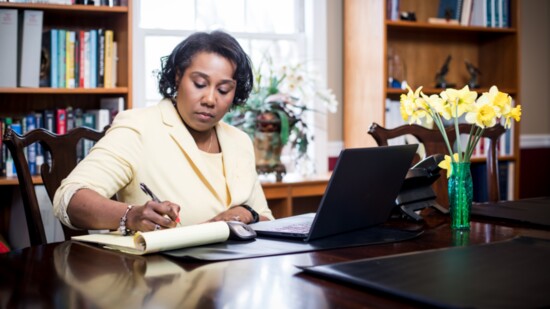Tamala Williams grew up in Chapel Hill, N.C., in a family of five. It was during college, Tamala realized she wanted to do something to help others. After graduating with a degree in Sociology, Tamala found herself in Atlanta working for an investment brokerage firm. That experience laid the foundation for the work she does today as a CERTIFIED FINANCIAL PLANNER™ and partner at Key Planning in Chamblee. Tamala also holds the Retirement Income Certified Professional™ designation. Tamala and her husband live near Chamblee with their family of “happy backyard chickens.”
When it comes to investing, we wanted to find out what it means to invest in yourself, so we spoke with Tamala to get a better understanding of the concept and why it’s important.
When creating a budget, we often hear you should “pay yourself first.” Why is this and what does it mean exactly?
Pay yourself first is a budgeting strategy where you put aside a percentage or fixed amount of money from each paycheck for savings, retirement, emergency fund or other specific account. You do this before you allocate any of your paycheck to other categories in your budget. The money set aside isn’t for frivolous spending. It’s to be saved or invested for the future. This budgeting method has been around for a long time and has proven to be effective. In fact, many people are already paying themselves first whether they intend to or not when they participate in an employee sponsored retirement plan like a 401K.
What does it mean to “invest in yourself” and what are some ways our readers can apply this concept?
I believe the phrase “invest in yourself” means intentionally putting time or money or discipline into improving your current situation and quality of life. People can invest in their health by committing to taking a certain number of steps each day or by going back to school or getting a certification or starting a business. I think it’s important to know that investing in yourself doesn’t necessarily require a dramatic shift in your daily life and it doesn’t have to come at a significant cost financially.
There are ways to invest in yourself without spending a lot of money. Exercising doesn’t require an expensive gym membership or costly at-home equipment. Many new skills can be learned by reading and applying the information. YouTube and TikTok are also great resources for learning. You can also ask someone to be your mentor or coach.
What are some of the rewards and benefits when it comes to “investing in yourself?”
Rewards from investing in yourself from a health standpoint could be living pain-free or without the use of prescriptions or improved flexibility. Financial rewards may be the choice to retire early or the experience of what it feels like to be completely debt-free. Often the benefits of investing in yourself are passed down or shared with others. For example, when parents leave an inheritance for their children – that wealth or those assets may have been from the discipline of the parents making sound investment choices over time and the children may reap the financial rewards from that discipline. It can really be a gift that keeps on giving.
We hear a lot about self-care. Would you consider this as a way to invest in yourself? If so, what are the benefits of self-care?
Yes! The way I look at it, self-care is self-preservation! It’s so important to practice self-care, which is also an example of investing in yourself. Financial self-care can allow you to support people and causes that you care about, and it can reduce the stress from overspending. Most importantly, financial self-care can help you plan for the future and reach goals such as owning a home or retiring. Self-care practices will hopefully have you feeling more energetic, improve your mood, and help you gain a greater purpose in life.
How can we moderate spending when it comes to investing in yourself and self-care?
The best way is to stick to a budget. If there’s something specific you want to do or accomplish, save and plan for it as you would for a vacation or large purchase. Also, look for ways to reduce or eliminate expenses. For instance, in most households there are several subscription based streaming services. It’s good to review those subscriptions and cancel the ones that aren’t used often.
When you make a commitment to invest in yourself, there should be a high emphasis on accountability. That is, accepting responsibility for your actions or inactions. If you struggle with self-accountability, ask a trusted friend or family member to be an accountability partner. And learn to say no when you need to.
For more information about Tamala and Key Planning Financial Advisory & Tax Planning, visit keyplanning.com.
When it comes to investing, we often hear you should pay yourself first and that it's important to invest in yourself. We wanted to find out what it means to pay yourself first and to invest in yourself, so we spoke with Tamala Williams of Key Planning in Chamblee to get a better understanding of the concept and why it’s important. What we found is that investing in ourselves can be relevant to our well-being and requires strategy and takes some discipline. Read the full story for details.
Tamala Williams earned her degree in Sociology. Currently, she is a CERTIFIED FINANCIAL PLANNER™ and partner at Key Planning in Chamblee. Tamala also holds the Retirement Income Certified Professional™ designation.
Disclaimer: Securities offered through Registered Representatives of Cambridge Investment Research, Inc. a broker-dealer, member FINRA/SIPC. Advisory services offered through Cambridge Investment Research Advisors, a Registered Investment Adviser. Key Planning and Cambridge are not affiliated.
"It’s so important to practice self-care, which is also an example of investing in yourself." Tamala Williams, CERTIFIED FINANCIAL PLANNER™ and partner at Key Planning








